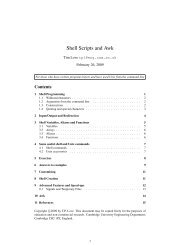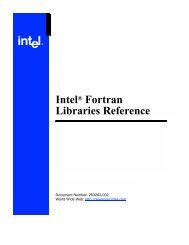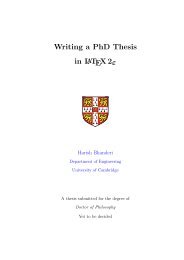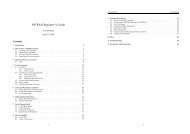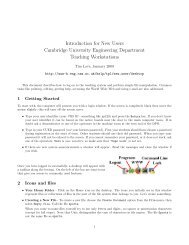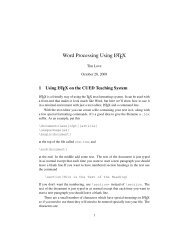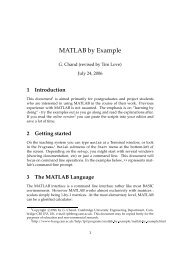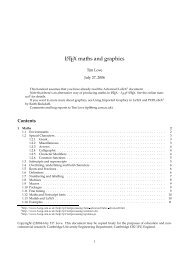PDF version - Computing Help - University of Cambridge
PDF version - Computing Help - University of Cambridge
PDF version - Computing Help - University of Cambridge
Create successful ePaper yourself
Turn your PDF publications into a flip-book with our unique Google optimized e-Paper software.
1A C++ courseworkhttp://www-h.eng.cam.ac.uk/help/tpl/languages/C++/...Work through the document at your own speed. Getting ahead <strong>of</strong> this schedule is fine, but you shouldn't fall far behind it. When you'vefinished exercises 1-4 get a demonstrator to mark your work (4 marks). Try to get at least that far on your first day <strong>of</strong> programming.When you've had exercises 1-4 marked, continue with the other exercises. When you've finished exercises 5-9, get them marked (5marks), then finish exercises 10-12 before the final marking (3 marks). If you finish early, you're strongly advised to try some Moreexercises (#Moreexercises) .Start sessions in the DPO by clicking on theicon at the bottom <strong>of</strong> the screen and then clicking on the AllCUED Applications option, then the "1st Year" option and then "Start 1A<strong>Computing</strong>". This will put some icons on the screen for you,and give you a folder called 1AC++Examples full <strong>of</strong> example source code. It also creates a folder called 1A<strong>Computing</strong>, a good place tostore any course-related files.If you want to work from home, see our Installing C++ compilers (http://www-h.eng.cam.ac.uk/help/tpl/languages/C++/InstallingC++compilers.html)page.In the course <strong>of</strong> this work your screen might become rather cluttered. The Window management (http://www-h.eng.cam.ac.uk/help/tpl/new_user/desktop/index.html#Windowmanagement) section <strong>of</strong> the New User Guide has some useful tips.Variables [ back to contents (#Contents) ]Variables are places to store things. The lineint num;creates a variable called num in which an integer can be stored. Note the final semi-colon - in C++, semi-colons are a little likefull-stops at the end <strong>of</strong> English sentences. You can also have variables that store afloat ("floating point" number - a real number)char (character)string (text)etc. To set an existing variable to a value, use an = sign. E.g.num=5;ornum=num+1;The latter line might look a bit strange at first sight, but it isn't saying that the LHS is the same as the RHS. It's an assignment - it'ssetting the LHS to the value <strong>of</strong> the RHS - i.e. adding 1 to num.You can create and set a variable in one line. E.g.float num=5.1;C++ is fussy about variable names - they can't have spaces or dots in them, nor can they begin with a digit. It distinguishes betweenupper and lower case characters - num and Num are different variables. It's also fussy about the type <strong>of</strong> the variable - you can't put textinto an integer variable, for example.[show extra information] (index.php?reply=extravariables#Variables)2 <strong>of</strong> 36 11/01/2012 04:05 PM



